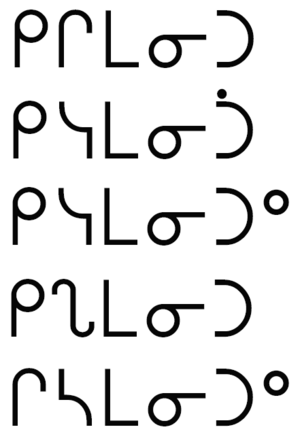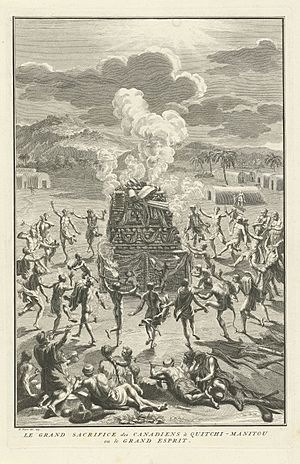Gitche Manitou facts for kids

Gitche Manitou (also spelled Gitchi Manitou or Kitchi Manitou) means "Great Spirit" in several Algonquian languages. These languages are spoken by many Native American groups.
Christian missionaries sometimes used the name Gitche Manitou to mean God when they shared their beliefs with Algonquian-speaking people.
The word Manitou is a common Algonquian term. It can mean spirit, mystery, or a powerful being. Many Native American Churches in Mexico, the United States, and Canada still use this term today.
Contents
The Great Spirit in Anishinaabe Culture
In Anishinaabe culture, the word Gichi-manidoo means "Great Spirit." This spirit is seen as the Creator of everything and the Giver of Life. Sometimes, it is also called the "Great Mystery."
Long ago, the Anishinaabe people believed in many different spirits. They would place images of these spirits near their homes for protection.
According to Anishinaabe stories, Mackinac Island in Michigan was the home of Gitche Manitou. Some Anishinaabe tribes would travel there for special ceremonies to honor the spirit.
The famous poet Henry Wadsworth Longfellow wrote about Gitche Manitou in his poem The Song of Hiawatha. In his poem, he spelled it Gitche Manito.
Other Anishinaabe names for the Great Spirit include Gizhe-manidoo ("venerable Manidoo") and Wenizhishid-manidoo ("Fair Manidoo"). Another important term is Gichi-ojichaag ("Great Spirit"). While both Gichi-manidoo and Gichi-ojichaag mean "Great Spirit," Gichi-manidoo refers to a larger spiritual connection. Gichi-ojichaag is more about a person's own soul connecting to the Great Spirit.
Beliefs in Other Tribes
Many other tribes, not just the Anishinaabeg, also believed in a Great Spirit like Gitche Manitou. For example, the Cheyenne and the Oglala Sioux people in the Great Plains also had beliefs about this powerful being.
Here are some similar words for the Great Spirit in other Algonquian languages:
- Ojibwe: Gichi-manidoo
- Ottawa: Gchi-mnidoo
- Swampy Cree: Kihci-manitô
- Miami: Kihci Manetoowa
- Lenape:
* Minsi: Kitschimanitto * Unami: Ketanëtuwit
- Nanticoke: Gichtschi Manitto
Other related terms include:
- Ojibwe: Gizhe-manidoo
- Ottawa: Gzhe-mnidoo
- Swampy Cree: Kise-manitô
- Naskapi: Chisa-manitu
- Illinois: Kisseh Manetou
- Shawnee: Wishemenetou
Early Christian missionaries often used Gitche Manitou as a name for God when teaching Algonquian peoples. This can be seen in old songs like the "Huron Carol".
Manitou as a Life Force
Manitou is a spiritual and fundamental life force among Algonquian groups. It is a key part of Native American mythology. Manitou is like the idea of qi in East Asian cultures, which talks about the connection and balance in nature and life.
Simply put, Manitou can refer to a spirit. This spirit is seen as both a person and a concept. Everything has its own manitou – every plant, every stone, and even machines. These manitous are not ranked like gods and goddesses in some other religions. Instead, they are more like different parts of a body working together. All these individual manitous together form the collective Gitche Manitou.
See also
- Ahone
- Manitoba
- Manitoulin Island
- Names of God
- Supreme Being
- Wakan Tanka


